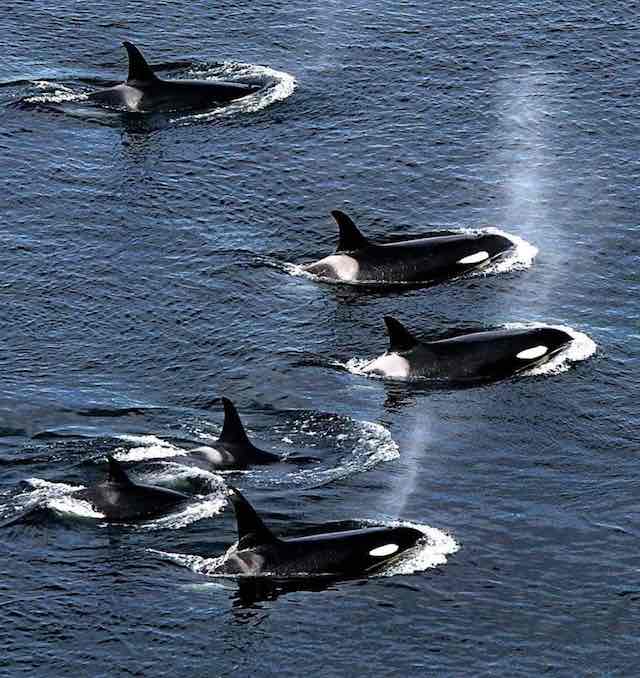forum
library
tutorial
contact

Another Orca from 'Baby Boom' Dies,
Fears Expressed about Extinction
by Staff
KOMO News, September 25, 2017
|
the film forum library tutorial contact |

|
Another Orca from 'Baby Boom' Dies,
by Staff
|
We know that the SRKW population-sustaining prey species is Chinook salmon, but resource managers
hope that they find something else to eat for survival, at least beyond their bureaucratic tenure.
 FRIDAY HARBOR, Wash. -- The Center for Whale Research says a 2 1/2-year-old male orca has died -- the third of six whales born during a so-called baby boom of the Southern Resident orcas that began in December 2014.
FRIDAY HARBOR, Wash. -- The Center for Whale Research says a 2 1/2-year-old male orca has died -- the third of six whales born during a so-called baby boom of the Southern Resident orcas that began in December 2014.
The death prompted warnings that the Southern Resident killer whales are getting closer to extinction.
Kenneth Balcomb, founder and principal investigator for the center, said the whale, identified as J52, may have died from malnutrition..
"Young J52 was accompanied by his mother (seventeen and a half year old, J36) and an adult male (twenty-six year old L85, potentially his father) at least five miles away from the other members of J and L pods that were foraging within a mile or two of the coastline from Camper Creek to Bonilla Point west of Port Renfrew, British Columbia," Balcomb wrote on the center's website.
"The observation of this sad event was at sunset, and the young whale appeared very lethargic while barely surfacing as the two adults were swimming around in circles and not feeding while attentive to the young whale. We estimated J52 was within hours, if not minutes, of death at the time, and he was not present during the J pod foray into Puget Sound on 19 September, though his mother and L85 were."
Balcomb wrote that in addition to the three whales from the "baby boom" who have died, two mothers and a great-grand mother have died.
The deaths represent the biggest year-to-year decline in the population ever recorded, according to the Center for Biological Diversity.
This death represents the biggest decline from year-to-year ever recorded, said the Center for Biological Diversity.
"The death of another killer whale puts this iconic population on a dangerous path toward extinction," said Catherine Kilduff at the Center for Biological Diversity. "If these whales are going to survive, we need to move quickly. Five years from now, it may be too late."
No babies in Southern Resident group have been born alive in 2017, Balcomb wrote
He also made a dire warning about the future of the animals.
"This population cannot survive without food year-round - individuals metabolize their toxic blubber and body fats when they do not get enough to eat to sustain their bodies and their babies. Your diet doctor can advise you about that. All indications (population number, foraging spread, days of occurrence in the Salish Sea, body condition, and live birth rate/neonate survival) are pointing toward a predator population that is prey limited and non-viable. We know that the SRKW population-sustaining prey species is Chinook salmon, but resource managers hope that they find something else to eat for survival, at least beyond their bureaucratic tenure. Our government systems steeped in short-term competing financial motives are processing these whales and the salmon on which they depend to extinction. If something isn't done to enhance the SRKW prey availability almost immediately (it takes a few years for a Chinook salmon to mature and reproduce, and it takes about twelve years for a female SRKW to mature and reproduce), extinction of this charismatic resident population of killer whales is inevitable in the calculable future. Most PVA's (population viability analyses) show functional extinction as a result of no viable reproduction within decades to a century with current predator/prey trajectories, but it can happen more quickly than that."
Related Pages:
UW Professor's Study Links Food Scarcity to Orcas' Failed Pregnancies by Lynda Mapes Seattle Times, 6/28/17
As the Chinook Go, So Go the Orcas by Peggy Andersen, Seattle Post-Intelligencer, 4/5/6
learn more on topics covered in the film
see the video
read the script
learn the songs
discussion forum
